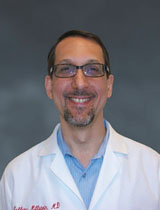Takeaway
In the aftermath of my patient’s devastating consequences of illness, his reaction was anything but what I expected.

Passion in the medical profession | March 29, 2023 | 1 min read
By Jeffrey Millstein, MD, Penn Medicine
I open the exam room door to see my patient, a tall, brawny middle-aged man with diabetes displaying thick bandages on both hands, and stumps where both legs used to be at the time of our last visit about a year ago. His wife is beside him, carrying a heavy ream of printed hospital records. I sit stunned as they recount his recent hospitalization for a severe infection, during which time a loss of blood flow to his extremities required life-saving amputations of several fingers, and both legs below the knees.
When they finish telling the story, I expect them both to sit back and prepare to receive my efforts to acknowledge the patient’s suffering and look for ways to help him recover. Instead, to my surprise, he extends both wounded arms toward me and exclaims with child-like enthusiasm, “Look–the surgeon saved my thumbs and I still have my grip!”
When I ask my patient how he’s come to terms with his situation, and even seems overjoyed despite his amputated legs and deformed hands, he explains that his passion in life is fishing. If he can bait his hook and hold a fishing pole, life will be just fine. I sit in awe of his resilience and spirit, as well as by his surgeon’s extraordinary effort to preserve a function so meaningful to him.
When treating patients in the aftermath of serious illness or injury:
1. Explore what brings meaning and purpose to their lives.
2. Avoid assumptions about how they’re coping.
3. Acknowledge both positive and negative feelings.
4. Offer support and celebrate all aspects of recovery.
This piece expresses the views solely of the author. It does not necessarily represent the views of any organization, including Johns Hopkins Medicine.

